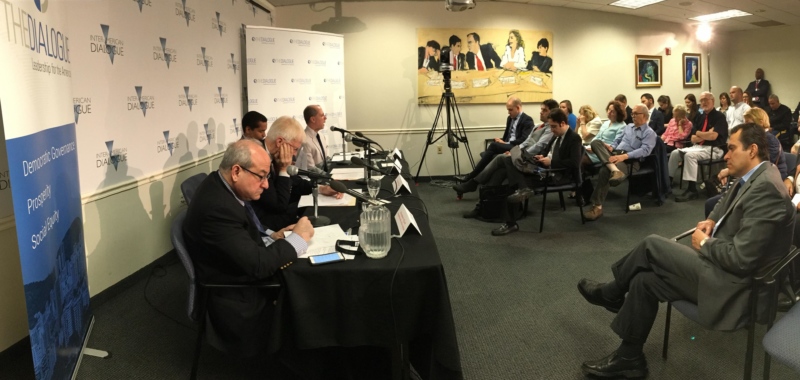Debt and Politics in Puerto Rico
 Ben Raderstorf / Inter-American Dialogue
Ben Raderstorf / Inter-American Dialogue
Puerto Rico faces a deeply troubling economic outlook, with $70bn worth of total debt that it cannot currently service. The debt crisis has gone hand in hand with social challenges such as a deeply indebted pensions system, increasing levels of unemployment and poverty, the threat of a rampant Zika epidemic, and large outflows of skilled and unskilled workers alike who migrate to the mainland in search for better opportunities. In response, Congress is seeking to ameliorate the island’s situation with the PROMESA bill, which establishes an autonomous fiscal control board that will oversee Puerto Rico’s budgetary management and debt restructuring. In order to discuss the bill’s effectiveness in dealing with the situation, and to engage with larger questions concerning the structural economic and political causes of Puerto Rico’s woes, The Dialogue held a conversation between three prominent experts on the issue: Barry P. Bosworth, a senior fellow in the Economic Studies Program at the Brookings Institution; Rafael Cox Alomar, a professor of law at the University of the District of Columbia, and Jose Raul Perales, a former Assistant Secretary for the Private Sector within the Office of Policy at the U.S. Department of Homeland Security.
"Puerto Rico has an institutional problem" -José Raúl Perales #DebtPoliticsPR pic.twitter.com/qv49GY4GBC
— The Dialogue (@The_Dialogue) June 1, 2016
The event began with each of the speakers explaining their thoughts on how and why Puerto Rico has reached its current state of affairs. Bosworth focused on the long-term economic context that has surrounded the island as an explanation for its crisis, as quoting changing tax and tariff policies that have led Puerto Rico to =“declinine relative to the United States steadily since 1975.” Cox Alomar emphasized the geopolitical roots of Puerto Rican struggles, claiming that there is a “correlation between Puerto Rico’s colonial condition and the current crisis.” He cited the territory’s dependency on the central government’s fiscal, trade, regulatory, and monetary policies— as well as its non-state status and inability to declare bankruptcy to escape its debt—as the key roots for the present scenario. Lastly, Perales highlighted the lack of quality in Puerto Rico’s domestic institutions, local economic mismanagement through short-sighted fiscal policies, and weak productivity levels as the main contextual explanations for the crisis.
#PROMESA is not a bailout, says Barry Bosworth #DebtPoliticsPR pic.twitter.com/Wxir7xHfdD
— The Dialogue (@The_Dialogue) June 1, 2016
The conversation then addressed the solution proposed by Congress to the problem; namely, the implementation of an autonomous oversight board made up of individuals chosen by President Obama from a congressionally-approved list of candidates. There was agreement that, while the PROMESA bill is not a bailout and offers a much-needed temporary response, it is still flawed in its details and execution. Bosworth stated that even though the bill “recognizes reality” the board must be created in a “cohesive” way without the inclusion of bondholders in order to prevent a gridlock in negotiations. In addition, Alomar claimed that the main problem with the board is its lack of legitimacy as Puerto Ricans will not feel represented by such an external, non-elected body. He also criticized the bill’s lack of liquidity facilities for short-term payments, drawing a contrast with the control board set up for Washington, D.C in the 1990s, which offered liquidity channels for the municipality. Furthermore, Perales claimed that the way the board would work is “fundamentally flawed” as it doesn’t set guidelines to avoid a protraction of the debt renegotiation process beyond February 2017, when the freeze on bond payments ends. He also cited the lack of technical macroeconomic and budgetary assistance (similar to the assistance the IMF would give) as an additional weakness in Congress’ plan.
.@rcoxalomar argues that the fiscal control board will face a "lack of legitimacy" on the island #DebtPoliticsPR pic.twitter.com/QJ6oPYZWwz
— The Dialogue (@The_Dialogue) June 1, 2016
Even with their differing viewpoints, all of the event’s speakers agreed on the severity of the situation for Puerto Rico’s socioeconomic prospects. Both Perales and Alomar saw the debt crisis as a problem that echoes larger issues of Puerto Rico’s lack of statehood and simultaneous lack of autonomy, as evidenced by its inability to obtain liquidity from the Federal Government and to seek another lender of last resort, such as the IMF. The fact that Puerto Rico does not have a bargaining chip to use against the US in this case sets it aside from the otherwise similar case of Greece, and makes its situation particularly difficult to overcome without preventing the existing social costs from worsening. Congress might be doing something about it, but there were common worries that it might not be enough to fix the island’s structural economic and political conditions. An internal and external plan that allows Puerto Rico’s economy to be internationally competitive, productive, and consistently solvent still seems to be lacking, and it might even necessitate an eventual reevaluation of the island’s territorial status. Whether the crisis is too large to even make such a solution conceivable is still up for debate, while action of some kind is an imminent necessity.



















